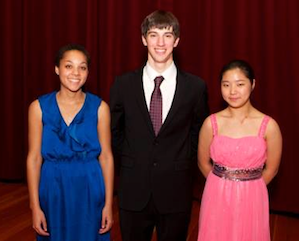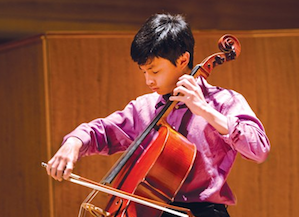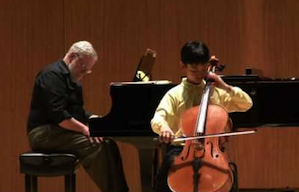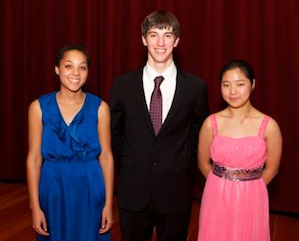
Jeremy Tai waggled his cello into position, tuned it, and got to work. Slowly at first, then gradually faster and faster until he hit the tempo he was after, Tai ran through a tight little figure riddled with double stops from the Shostakovich Cello Concerto No. 1. The repetitions — 10, 20, 30 times and more — filled the tiny practice room at the San Francisco Conservatory of Music like tightly packed bricks.
Dressed in black, his face fixed with concentration, the 15-year-old sophomore at Mountain View’s Saint Francis High School gave off an air of self-possession and a sense of purpose of someone twice his age. Already a winner of the MTNA National String Competition, the Mondavi Center National Young Artists Competition, and the MTAC VOCE Competition, Tai had his sights set on the upcoming Irving M. Klein International String Competition, June 5–8, at San Francisco State University. Before that, he and his family would be flying to Kalamazoo, Michigan, for the Stulberg International String Competition (where he did not come away a winner).
Tai began gearing up for his Stulberg/Klein double-header in January, when he added an hour to his normal two- to three-hour-a-day practice regimen. More important, he began to use his practice time in a different way.
“Usually when I drill, it’s really boring,” said Tai, perched on a Conservatory hallway bench with his instrument at his feet. “I might be thinking about a school project or other music or even nothing.” But preparing for a competition, he went on, “forces me to do the best I can every day. Partly it’s the pressure. Now, in addition to drilling, I’m thinking about my bow grip and my posture and my vibrato. My intonation has gotten better. Before, I was just playing notes. Now I’m thinking, what did Shostakovich mean?”
“Preparing forces me to do the best I can every day. Partly it’s the pressure. … Before, I was just playing notes. Now I’m thinking about what did Shostakovich mean?” — Cellist Jeremy Tai
An hour later, in a Pre-College Division dress rehearsal in the Conservatory’s Concert Hall, before a smattering of parents, teachers, and a few other listeners, Tai looked and sounded every bit a winner. In a gripping account of the concerto’s first two movements, with Miles Graber at the piano, Tai delivered on all fronts, with a pithy, dark-hued tone; phrasing that was, by turns, taut and voluptuous; a glittering technique that tore through that fiendish passage he’d just focused on upstairs; and a dramatically commanding demeanor.
Impressive as Tai is, when it comes time for a competition, he’s one among many highly gifted and rigorously well-trained young musicians. And wherever he’s competing, some other group of eager young string players or pianists or singers will be vying with each other somewhere else. The universe of music competitions appears to be an endlessly expanding one. No one knows just how many star-seeking contests are out there — large and small, well-run and poorly managed, rich and not-so, productive and exploitive. Some come and go. Others keep appearing on the horizon.

While criticism of music competitions dates back at least to the 19th century — Felix Mendelssohn swore off them in 1840, declaring that “it would be sheer arrogance on my part” to “set myself up as a criterion and my taste as incontrovertible,” while Béla Bartók later famously sneered, “Competitions are for horses, not artists” — the well-established practice has many advocates.
Greg Henkel, director of artistic administration at the San Francisco Opera, has judged eight Metropolitan Opera regional finals and two national finals, among many other competitions around the world. “I consider it part of my job duties,” said Henkel. “It’s a great way to discover talent. And for singers it’s a wonderful way to audition for six opera companies at once. Every opera company keeps an eye on who wins.”
Henkel hired tenor Matthew Grills for the company’s production of The Tales of Hoffmann after hearing him in the Met regional finals in New Orleans in 2012. Nicole Cabell, who won the 2005 BBC Singer of the World Competition, returns to the San Francisco Opera House this month as Violetta in La traviata.
Henkel draws a distinction between judging a voice and judging a singer. “There are wonderful voices out there that don’t necessarily sing that well. You might be astounded by the beauty of the phrasing or language or musicality, but the stage presence isn’t there. Other times, you’re floored by a gift of great expression, but the great instrument isn’t there.”
All judges have their own predispositions. “Really, this is a communicative art,” said Henkel, “and the most important part of it is being able to move people through expression. If you put two brilliant voices together, the one who can express wins.” And, as Henkel acknowledged, a certain amount of luck or serendipity, based on a small sample size, is involved. “One can only judge on the basis of what one heard and saw that day.”
Noncompetitive Motivation

Violinist Joseph Maile and the other three members of the Telegraph Quartet had a very good day last month in South Bend, Indiana, when the San Francisco–based ensemble won two gold medals — in the string division and overall — at the 2014 Fischoff National Chamber Music Competition. Maile and his colleagues (three of the four players met as students at the S.F. Conservatory) saw the competition as a chance to work on new repertoire while “shooting for something and playing the best we could.” Another bonus was the opportunity to hear themselves in a decent hall. “Most of the time,” said Maile, “we play in our living rooms.”
Maile made a point of crediting the group’s mentors, the Conservatory’s Mark Sokol and Ian Swenson. Winning, said Maile, “felt kind of surreal.” It also “felt very good.” So did the prize money ($10,000), the tours of the Midwest and Italy that go along with it, and the potential career boosts from the exposure and contacts they made.
While winning is always sweet, some competitions try to humanize an enterprise that’s finally about drawing thumbs-up and thumbs-down distinctions. Founder Mitchelll Klein and Executive Director Fred Spitz, who run the 28-year-old Klein Competition, are both thoughtful about the care and feeding of aspiring young artists, ages 15 to 23.
“We try to deemphasize the cutthroat competitive aspects,” said Klein. Semifinalists are housed with supportive host families. There are social activities, including a welcoming party with board members. “In 28 years, only two competitors came and separated themselves from the group,” noted Klein, adding that neither of them wound up as winners.
By spreading out the judging over several days, said Spatz, the one-and-done formula is mitigated. “We ask jurors to consider the overall artistic performance over the two days. We are looking for some sort of complete performing excellence. What impresses people the most are kids who are willing to take some risks and then succeed.” But, as Spatz allowed, “Some of it may come down to who had the better night’s sleep. And who moved the jury on that day.”
No matter how humanely a competition is organized, it is, after all, a contest — a form of combat that results in winners and de facto losers. As such, it partakes of a wider cultural phenomenon that seems to have turned almost everything into a competition.
Celebrity-Making Circuses and the Downsides of Competition
In today’s “reality”-mad television programming, cooking (Top Chef), ballroom dancing (Dancing With the Stars), pop singing (American Idol, The Voice, and so on), sex and marriage (The Bachelor and The Bachelorette) — even life itself (the vintage Survivor) — are enacted as battles leading to the artificially constructed peaks of victory and teary troughs of defeat.

Writing in Psychology Today in 2013, Jim Taylor wondered if “this trend toward making these most personal activities competitive suggests some deeper malaise spreading across our cultural and spiritual landscapes. Are so many people no longer finding such inherently enjoyable avocations meaningful? Do so many people find watching others compete at these activities more rewarding than actually doing them themselves simply for the joy of it?”
The trend is by no means restricted to the realms of art and entertainment. Buildings get made because someone, often a previous winner, has won yet another architectural competition. Joggers who used to run to stay healthy have morphed into weekend warriors who train for marathons, ultramarathons, even mud-drenched obstacle courses. State education systems are pitted against each other in the Obama administration’s multibillion-dollar Race to the Top initiative.
Many educators are alarmed by the ethos of competition that seeps into every aspect of life, especially the classroom. In his book No Contest: The Case Against Competition, education writer Alfie Kohn cites 65 studies over a 56-year period that show “children learn better when they work cooperatively as opposed to competitively.” Eight studies found the reverse, and 36 found no significant difference. “The more complex the learning task,” Kohn argued, “the worse children in a competitive environment fared.”
In her work on classroom creativity, Brandeis University psychologist Teresa Amabile invited children to make “silly collages.” Those who were competing for prizes devised collages that were “less spontaneous, complex and varied,” Amabile found, than the children who were working without the spur of a competition.
“What impresses people the most are kids who are willing to take some risks and then succeed. Some of it may come down to who had the better night’s sleep.” — Fred Spatz, executive director, Irving M. Klein String Competition
In Ivory Trade, his classic 1990 study of the Van Cliburn International Piano Competition, Joseph Horowitz documented the rise of competitions following Cliburn’s own unexpected and dramatic win at the International Tchaikovsky Competition in Moscow in1958, a politically tinged triumph for America at the height of the Cold War. Distressed by the glitz and self-promoting glamour of the event, Horowitz showed how relatively few winners of the Cliburn went on to have significant careers. Mitsuko Uchida is one notable name who slipped past the Cliburn judges.
Horowitz proposed improvements to this and other competitions, which would include eliminating the first, second, and third prize rankings and returning the piano competition to “its original conception as a festival of pianists and piano music, a dignified showcase for gifted young performers.”
A 2013 post on The Strad, a publication for and about string players, updated the issue this way: “There are those who argue that in the age of YouTube, Facebook, and cultural entrepreneurship, competitions are outdated. Certainly a win at a major contest has never been a guarantee of career success — first-prize winners frequently fade into oblivion while others ascend to the heights of stardom. Then again, the life of a competition entrant overlaps greatly with that of a performing artist — it is a life of discipline, constant analysis, and unanswered questions, fraught with setbacks and criticism.”
The Competition as Rite of Passage
Asked if music was inherently competitive, the Telegraph Quartet’s Maile paused a moment. “As a business, yes,” he said, “just by virtue of there being only so many venues and so much money, and so many ensembles [trying to get a foot in the door]. I don’t like to think of music in general as being competitive — we all want to make music together. But yes, I guess it is. All judgments are subjective. Some of it has to do with being in the right place at the right time.”
“I don’t like to think of music in general as being competitive — we all want to make music together. But yes, I guess it is.” — Joseph Maile, violinist, Telegraph Quartet
However alluring the glory, cash prizes, and potential future concert engagements are, a certain measure of skepticism and ambivalence might be the healthiest response, for winners and also-rans alike. Keyboardist Chris Donnelly offered some seasoned and self-aware observations after coming up short in the 2012 Nottingham International Jazz Piano competition. Winning such an event or being awarded a prize, he wrote on his blog, “are designed to accomplish the same thing: To formally recognize an individual’s contribution to a domain. It’s a rite of passage, a tribe’s acceptance, and a tribe’s renewal. There’s nothing wrong with music competitions, just as there’s nothing wrong with the World Series or with choosing which shirt to purchase. They’re just as important and necessary as any other form of judgment.”
He did concede his own disappointment: “I’ve spent 10 years practicing, crafting, studying, writing, memorizing, transcribing, and performing loads of solo piano music only to be beaten by a 14-year-old reading a lead sheet, among others. That’s the price you pay for being part of a broadly defined and loosely organized domain. I wouldn’t have it any other way.” The Nottingham, he noted, was his last competition: “I’ve passed the age limit restrictions.”
For Jeremy Tai, the future is just beginning. “I don’t want to fail miserably,” he said of the upcoming Klein Competition. But he’s anything but single-mindedly obsessed. He likes to read science fiction, hang out with his friends, and arrange music for a cello quartet he helped organize. He admitted that his mother, a piano teacher, sometimes has to goad him to practice.
“I like the cello,” he said. “I like playing it. I don’t know if I’m going to do it for a career.” Then he went into the empty practice room and began peeling off those feisty Shostakovich phrases.

